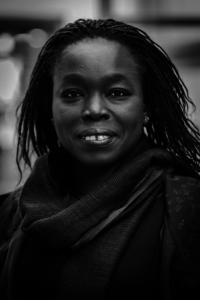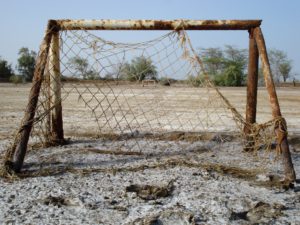Isadora Hutcheson-Lovett is currently studying for an MA in Postcolonial studies at SOAS, University of London. Her main fields of interest are Haitian trauma fiction and the complex convergences between perpetrator and victim-hoods.

Le Ventre de l’Atlantique by Fatou Diome
Published in 2003, Fatou Diome’s début novel Le Ventre de l’Atlantique (The Belly of the Atlantic) followed a defining moment in modern Franco-Senegalese history: the 2002 Fifa World Cup. In the opening match of the tournament, the debutant team of Senegal beat its hexagonal adversary with a score of 1-0. Coinciding with the ensuing wave of sporting infatuation and national pride, Diome’s depiction of football-mania on the island of Niodior acts as a gateway to a wider discussion on migration and the mirage of Europe.
Following in the semi-autobiographical footsteps of many female francophone Senegalese authors (Nafissatou Diallo’s De Tilène au Plateau: une enfance dakaroise and Mariama Bâ’s une Si Longue Lettre to name but two) and as one of the most prominent writers of the ‘Migritude’ movement (a term coined by Jacques Chevrier), Diome lays bare her experiences of migration through her counterpart and protagonist, Salie. Illegitimate outcast turned French-educated student, Salie feels ‘at home where Africa and Europe give up their pride and accept their intersection.’[1] This begs the question as to whether such a space exists, for it remains unseen throughout Salie’s narrative. Alongside nostalgic yet harrowing recollections of youth, siblings share bittersweet phone calls from afar. Salie does her best to dissuade her younger brother Madické from following her to Europe. Naïve, desperate and convinced that his sister has adopted European individualism, Madické refuses to reason with Salie, whose position in the Niodior hierarchy denies her rationality and opinion.

Author Fatou Diome writes in a semi-autobiographical mode
Traditional and modern mythologies of various crossings into solace grip the island, whose migrant sons and daughters are burdened by a binary mentality of pride and shame. The appeal of Europe is reinforced by the grandiose tales of a returned migrant named ‘l’homme de Barbès’. His anecdotes of advantage and luxury both obscure the painful reality of his ostracizing experiences, and contribute to the modern myth of an idealised migrant life in France. Rather than confront this falsified myth of Europe, Barbès chooses to perpetuate it and therefore remain on the more favourable side of the binary. Having brought back with him the island’s only television, Berbès is not only responsible for verbal affirmations of the myth, but also for the visual, by providing a window into globalised media and sport that presents the almost impossible eventuality of an easier life as a professional football player. The allure of this prospect is what leads to the downfall of the exploited young footballer Moussa, who bleeds his community’s savings dry to try out at an academy in France, only to not make the cut. Left with staggering debt to both the club and his loved ones, alone and without legal documents, he is eventually found by the police, living and labouring on a ship. For Moussa, the mirage has well and truly dissipated. He is detained by the police and swiftly shipped back to his homeland: ‘seventy-two hours later an aeroplane spewed him out on the tarmac of Dakar airport.’[2] It becomes evident then, that Diome’s football-oriented narrative is little to do with the beautiful game itself, but football-driven human trafficking and the neo-colonial plundering of African resources: economically vulnerable aspiring young players.

Abandoned goal post, Senegal by Juan Falque, Flickr
While Berbès is able to hide his migrant experiences, Moussa, having brought financial ruin to his kin, has overtly broken the modern myth, and thus turns to traditional mythology to maintain his family’s pride; he succumbs to the belly of the Atlantic, where the island’s outsiders seek refuge to exist freely in water as they could not on land. Invoking memories of numerous forced and coerced migrant deaths in the Atlantic, amongst other bodies of water, throughout centuries, Niodior’s legend is demythified. As Diome states in her passionate speech during a debate on Ce soir (ou jamais !), 2015, on the recent migrant crisis: ‘The person who leaves in order to survive, who believes that the life they risk losing is worth nothing, this person’s strength is unimaginable, because they are not afraid of death.’[3] Speaking 12 years after the publication of Le ventre de l’Atlantique yet raising the same issue of migrant and refugee mortality, Diome’s perspective unfolds: we cannot speak of a singular and temporally pertinent migrant crisis, but perennial migrant crises.
Le Ventre de L’Atlantique carefully intertwines mythology and individual tragedies with larger narratives to critique both the reception and origins of migration. Diome’s call to dispel the mirage of Europe sheds light not only on the migrant destination but also the domestic concentration of resources in urban centres and the predicament of those at the peripheries, such as Niodior, who are forced to look elsewhere for hope and opportunity. As a critically acclaimed bestseller in France, the novel’s position within world literature is worth considering, particularly in relation to its narrative. Published first in French and translated into in English in 2006, the limited choice of languages in which the book is available is telling. In Diome’s novel, access to education is both a rarity and a requisite; education is reserved for the upper echelons and French education in particular is essential to success (where success is defined as migration to Europe for a career either in sport or academia).
What does it mean, then, for the subjects of Le Ventre de L’antlantique to be partially excluded from its readership? The languages of publishing cater to the centre of power, rather than the periphery. Whilst It would be naïve to suggest that the responsibility for the chosen publishing languages lay solely at her feet, Diome is of course implicated in a certain politics of language (which has most notably been explored by Ngũgĩ wa Thiong’o in the famed Decolonising the Mind). In her engagement with this politics, the author’s participation in Migritude, born of the Francophone Négritude, has played a major role. In an interview with Jeune Afrique in 2008, she states: ‘I don’t experience French as a language of suffering, but a language of desire, love, joy, admiration, and, like Senghor, “I [too] eat it like jam”! […] When I use the language of Voltaire, I don’t feel like I’m borrowing it from French. This language belongs to us as much as it belongs to them.’[4] Whilst one could have argued that Diome had intended the novel for consumption by those at the centre, criticising Europe directly, her remarks confirm the opposite: all that is French does not belong to France and is therefore not necessarily intended for it either. This does not, however, counteract the elitism of French as an inaccessible language within Senegal. Perhaps then, the novel is partially intended to open a conversation with the Francophone elites of mainland Senegal, but what about those, like many of Niodior’s Serer population, whose fate depends on this conversation and for whom French has not become their own?
Le Ventre de l’Atlanqique’s peripheral engagement is not currently reflected in its exterior positionality. Implicated in a dialogue in which it cannot partake, the peripheral voice is bound to the central language. This is not to say that Diome should write in a language other than French, but that, ideally, as a piece of world literature, the novel should be available to those who don’t share her ownership of the language: to speak to those it speaks of. In doing so, the importance of peripheral voices and narratives, that is so evident within Diome’s writing, would be mirrored and celebrated in the cultural narrative.

Traditional fishing Pirogues, Niodior. Image credit Wikimedia Commons.
[1] Translated from the French ‘je suis chez moi là où l’Afrique et l’Europe perdent leur orgueil et se contentent de s’additionner’, Fatou Diome, Le Ventre de l’Atlantique (Paris: Librairie générale française, 2003), pp. 181-182.
[2] Translated from the French ‘Soixante-douze heures plus tard, un avion le vomit sur le tarmac de Dakar’, Fatou Diome, Le Ventre de l’Atlantique (Paris: Librairie générale française, 2003), p. 109.
[3] Translated from the French : “Celui qui part pour la survie, qui considère que la vie qu’il a à perdre ne vaut rien, celui-là, sa force est inouï parce qu’il n’a pas peur de la mort.”, Fatou Diome, Fatou Diome dans Ce soir (ou jamais !) – L’essentiel, online video recording, YouTube, 27 April 2015, https://www.youtube.com/watch?v=xgZ0LcMUghA [accessed 10 December 2017], 1:54.
[4] Translated from the French : ‘Je ne vis pas le français comme une langue subie, mais comme une langue désirée, aimée, savourée, adulée, et, comme Senghor, « je la mange [aussi] comme de la confiture » ! […] Quand j’utilise la langue de Voltaire, je n’ai pas le sentiment de l’emprunter aux Français. Cette langue nous appartient autant qu’à eux.’
Read the Book
Diome, Fatou, Le Ventre de l’Atlantique (Paris: Librairie générale française, 2003)
Diome, Fatou, The belly of the Atlantic, trans. by Lulu Norman and Ros Schwartz (London: Serpent’s Tail, 2006)
Further reading/watching
Diome, Fatou, Fatou Diome dans Ce soir (ou jamais !) – L’essentiel, online video recording, YouTube, 27 April 2015, https://www.youtube.com/watch?v=xgZ0LcMUghA [accessed 10 December 2017]
Chevrier, Jacques, ‘Afrique(s)-sur-Seine : autour de la notion de « migritude »’, Notre Librairie, 155-156, (July-December 2004), pp. 96-100.
Rowe, Mark, ‘The Beautiful Game?’, Geographical, November 2016, pp. 33-39.
Thiong’o, Ngũgĩ wa, Decolonising the Mind: The Politics of Language in African Literature (Nairobi: East African Educational Publisherws, 1986).
Zanganeh, Lila Azam, ‘Out of Africa’, The New York Times (June 12 2005) http://www.nytimes.com/2005/06/12/books/review/out-of-africa.html [accessed 10 December 2017>
Read the Book
Diome, Fatou, Le Ventre de l’Atlantique (Paris: Librairie générale française, 2003)
Diome, Fatou, The belly of the Atlantic, trans. by Lulu Norman and Ros Schwartz (London: Serpent’s Tail, 2006)
Further reading/watching
Diome, Fatou, Fatou Diome dans Ce soir (ou jamais !) – L’essentiel, online video recording, YouTube, 27 April 2015, https://www.youtube.com/watch?v=xgZ0LcMUghA [accessed 10 December 2017]
Chevrier, Jacques, ‘Afrique(s)-sur-Seine : autour de la notion de « migritude »’, Notre Librairie, 155-156, (July-December 2004), pp. 96-100.
Rowe, Mark, ‘The Beautiful Game?’, Geographical, November 2016, pp. 33-39.
Thiong’o, Ngũgĩ wa, Decolonising the Mind: The Politics of Language in African Literature (Nairobi: East African Educational Publisherws, 1986).
Zanganeh, Lila Azam, ‘Out of Africa’, The New York Times (June 12 2005) http://www.nytimes.com/2005/06/12/books/review/out-of-africa.html [accessed 10 December 2017>


Leave A Comment